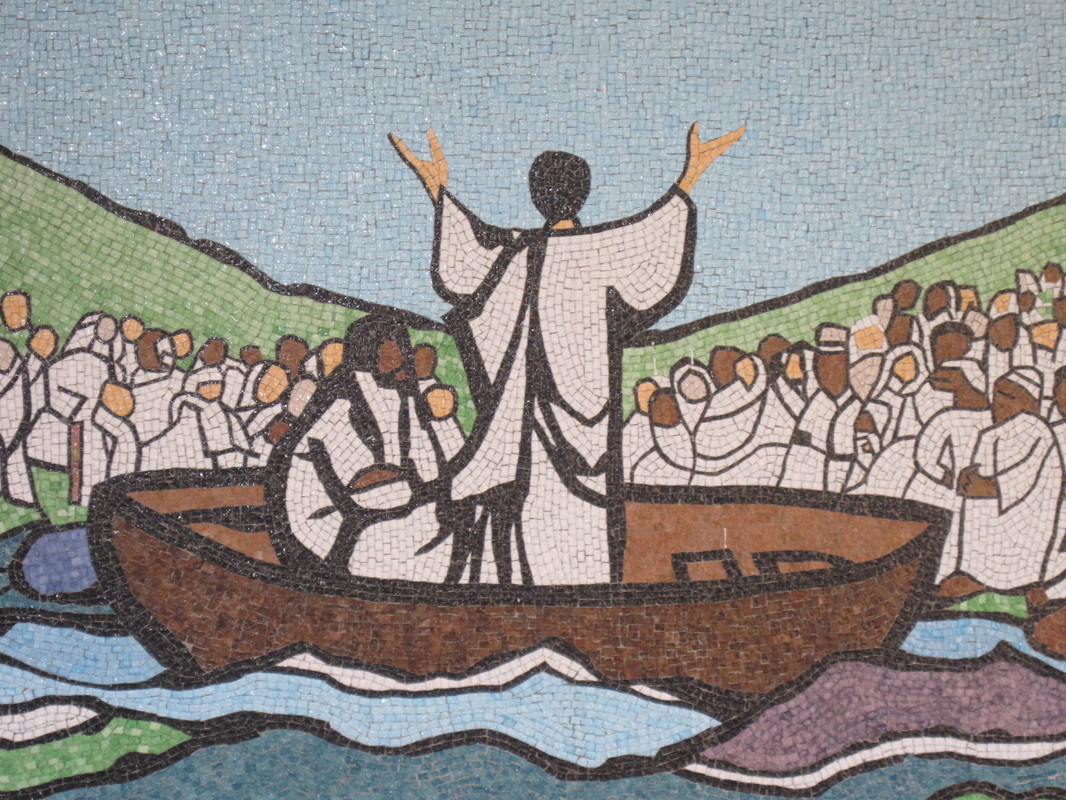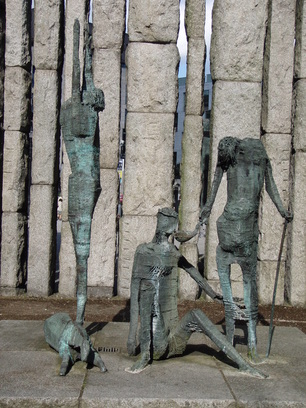Jesus' Living Theology
|
Clemens Sedmak writes that Jesus did “situational theology”; Jesus lived in the present and in the here and now.[65] Jesus did not do formal courses or open a school. He lived with the people, and he taught and healed among them. He was flexible in his approaches and in responding to the situations in which he found himself. Jesus was out in open spaces when he gave his great Sermon on the Mount to the crowds who followed him. He told them how to live a holy life. Matthew 5:3-12 lists the Beatitudes which exhort us to comfort those who mourn, be merciful and become peacemakers. The Gospel of Luke also includes the Beatitudes, as part of Luke’s Sermon on the Plain (Luke 6:20-26).
Clemens Sedmak highlights these New Testament scriptures that give examples of how Jesus was walking with the people:
|
Jesus’ Compassion for Humanity |
“have mercy on me” |
|
The scripture reading in Matthew 25:35-36 clearly describes how Jesus wants us to interact with community around us: “For I was hungry and you gave me food, I was thirsty and you gave me a drink, a stranger and you welcomed me, naked and you clothed me, ill and you cared for me, in prison and you visited me.”
Jon Sobrino cites four Gospel accounts where Jesus heals after someone calls out “have mercy on me” (Matt 20:29-30, 15:22, 17:15. Luke 17:13). |
Mt 17:14-18 A man came to Jesus about healing his son described as a “lunatic,” whom the disciples could not cure. The man knelt down before Jesus and said: “Lord have pity on my son.” Jesus cured the man’s son and then rebuked the disciples for their lack of faith that he saw was the reason they were unable to cure the boy.
Mt 15:21-28 When Jesus was in the region of Tyre and Sidon, a Canaanite woman who had a daughter tormented by demons called out to him, “Have pity on me Lord Son of David!” Jesus at first rebuffed her, and the disciples tried to keep the woman from Jesus. The woman was persistent, and Jesus acknowledged her great faith, then healed her daughter. Mt 20:29-34 Two blind men by the side of the road called out to Jesus as he was leaving Jericho: “Lord Son of David, have pity on us!” The crowd tried to quiet them, but they called out again to Jesus. Jesus showing compassion, stopped and “moved with pity” touched their eyes and they received their sight. Luke 17:13 When Jesus was traveling through Samaria and Galilee ten lepers approached from a village along the way. They cried out “Jesus, Master! Have pity on us!” Jesus healed all of them, and one returned to Jesus giving thanks. Jesus noted that the one who gave thanks was a Samaritan who was considered a foreigner in the village. The parable of the Good Samaritan (Luke 10:29-37) describes how Jesus answers the question: who is my neighbor? Two holy and religious persons pass up an injured person on the road, but a Samaritan stopped moved with compassion and cared for the stanger on the road. The Samaritan is described as a neighbor by Jesus : The one who treated him with mercy. Go and do likewise. The message Jesus asks us to comtemplate, is not who is my neighbor, but whom am I neighbor to? |
Topics
Jesus' Table MinistryLuke 19:1-10: Zacchaeus a despised and wealthy tax collector ran ahead of the crowds and climbed a sycamore tree to see Jesus in Jericho. Jesus tells Zacchaeus that he will come and stay with him. The crowd's reaction was to grumble and protest that Jesus would stay with a sinner. Jesus says to Zacchaeus: "Today salvation has come to this house because this man too is a descendant of Abraham. For the Son of Man has come to seek and save what was lost." See Why are we called to serve? for more on Jesus' Table Ministry.
Hope |
FaithThe Apostle James says this best: “For just as a body without spirit is dead, so also faith without works is dead” (James 2:26).
|
John 1:10: “He was in the world, and the world came into being through him; yet the world did not know him.” Christian conversation begins in John’s gospel[66] with the world not understanding - but also gives hope: “God so loved the world that God sent God’s only son” (John 3:16).
The famous words of Paul in Romans 8:38-39 resound with hope: “For I am convinced that neither death, nor life, nor angels nor principalities, not present things, not future things, not powers nor height nor depth, not any other creature will be able to separates us from the love of God in Christ Jesus our Lord.”
The famous words of Paul in Romans 8:38-39 resound with hope: “For I am convinced that neither death, nor life, nor angels nor principalities, not present things, not future things, not powers nor height nor depth, not any other creature will be able to separates us from the love of God in Christ Jesus our Lord.”
NOTE: All scripture quotations are from the Catholic Study Bible Second Edition New American Bible Edited by Donald Senior and John J. Collins.
© Copyright Sharon Dobbs 2016

